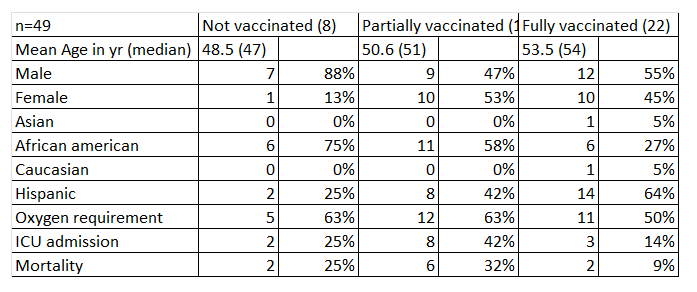Outcomes of SARS -Cov-2 in hospitalized solid organ transplant recipients during the Omicron wave in the United States
Walaa Dabbas1, Prerna Kumar1, Ruchi Naik1, Dana Pierce2, Kristin Heagler2, Benito Valdepenas2, Scott Benken2, Ignatius Tang1.
1Nephrology, University of Illinois at Chicago, Chicago, IL, United States; 2Pharmacy, University of Illinois at Chicago, Chicago, IL, United States
Introduction: Though SARS-CoV-2 mRNA vaccine has been effective in reducing the severity of COVID19 and associated hospitalization and mortality in the general population. Its effectiveness in the solid organ transplant recipients is not well studied. Here, we are presenting our outcome data of SARS-CoV-2 patients hospitalized during the omicron wave in a tertiary care center in the United States.
Method: We conducted a single center retrospective analysis of the effectiveness of SARS-CoV-2 mRNA vaccine in the hospitalized patients of kidney and simultaneous Kidney and Pancreas ( SPK) Transplant recipients from December 1, 2021 to February 25, 2022 during the Omicron wave. Patients were categorized according to the SARS-CoV-2 vaccination status at time of admission:1.Fully vaccinated-completion of 3 doses of SARS-CoV-2 mRNA vaccine.2.Partially vaccinated-1 or 2 doses of SARS-CoV-2 mRNA vaccine. 3.Unvaccinated. The data including demographics, clinical presentation and the course along with mortality were collected using electronic medical records. Standard statistical analysis was done.
Results: There were 49 kidney and SPK recipients hospitalized with SARS-CoV 2. The majority of patients were African American and Hispanic with the mean age of 51.9 +/- 12.6 years, out of which 21(42.8%) were females. Fourteen (8.1%) patients were within one year post transplantation period. Twenty-eight (57%) patients required oxygen therapy, 13 (26.5%) patients were admitted to the intensive care unit (ICU), out of which 10 (20.4%) patients died. Twenty-two (44.9%) patients were fully vaccinated, 19 (38.7%) were partially vaccinated, and 8 (16.3%) were unvaccinated (TABLE). In the fully vaccinated group, 11(50%) patients required oxygen therapy, 3 (14%) patients admitted to the ICU and 2 (9%) died. In the partially vaccinated group,12(63%) patients required oxygen, 8 (42%) admitted to the intensive care unit and 6 (32%) died. In the unvaccinated group 5 (63%) required oxygen therapy, 2 (25%) patients were admitted to the intensive care unit and subsequently died. One fully vaccinated patient and 2 partially vaccinated patients were admitted to the ICU for hyperglycemia management rather than COVID 19 related symptoms.

Conclusion: The Kidney and SPK transplant recipients who completed the primary series of SARS-CoV-2 mRNA vaccine (3 doses) had better outcomes. We may conclude that for immunocompromised patients vaccination can reduces the severity of COVID19 and associated mortality.

right-click to download
